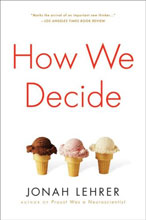
We don’t post enough about the “books” part of our culture here at Idol Chatter, so here’s my step in the right direction: there’s a great new book out for anyone who’s a person of faith and a deep thinker called “How We Decide,” by Jonah Lehrer.
In Gordon Marino’s review in this week’s Los Angeles Times, we learn a bit about Lehrer’s book which helps us determine why we choose “Honey Nut Cheerios or regular Cheerios.” It got me to thinking about that most important decision we’re all invited to make, regarding our faith in God, or choice to place our faith somewhere else, or actually whatever we choose.
“Lehrer begins by debunking the notion that we should all make our decisions like hyper-rational Mr. Spock,” Marino says. That’s great news for spiritually minded people who believe that effective decision making lies somewhere in the quadrasphere between logic, reason, emotion and relationship.
“Perfectly intelligent people become virtually unable to make the most trivial decisions when their capacity for feelings are flattened as a result of brain disease or trauma,” he summarizes. “Pondering the split-second judgments of quarterbacks, pilots and firefighters, Lehrer shows that if conscious reason were all we had, it would be impossible to make solid nanosecond decisions.”
One of the most powerful illustrations in Lehrer’s book comes from a combat situation where a Royal Navy Lt. Commander picked up a radar signal showing that something was coming towards their ship:
“In the heat of the Persian Gulf War, Royal Navy Lt. Cmdr. Michael Riley was manning a shipboard radar station when he picked up a blip showing something heading toward the Missouri. The projectile had the profile of both an incoming coalition A-6 aircraft and an enemy Silkworm missile. Riley had no criteria for deciding between the two and was tortuously suspended between the possibilities of allowing a strike and blasting his brothers-in-arms out of the sky. But, Riley said, ‘There was something strange about this radar blip. It didn’t feel like an A-6.'”
The story continued: “On gut feeling, Riley gave the order to shoot down what turned out to be an enemy missile. After hours of analysis, the officer and a cognitive psychologist resolved that his feeling was a subliminal recognition that the missile entered his screen at a slightly different interval from the planes he was used to tracking.”
By comparing and contrasting the writings of Plato, Descartes, and others, Lehrer uses stories like Riley’s–where he would turn out to be a hero or a court-martialed goat depending on his choice–to help the reader consider his or her own decision making processes.
“Doubts are unpleasant turbulence to brains barreling towards conclusions.”
Another of his conclusions: “if we want to improve our decision-making IQ’s, we need to make an effort to nurture our inner skeptics.”
Frankly, I don’t think this topic gets enough thought, which makes the review a nice invitation and the book worth ordering. Also, I’m curious to read the author’s insights, given that he’s still in his twenties, a couple generations removed from me. If you read it as well, I’ll be curious to hear your thoughts.


